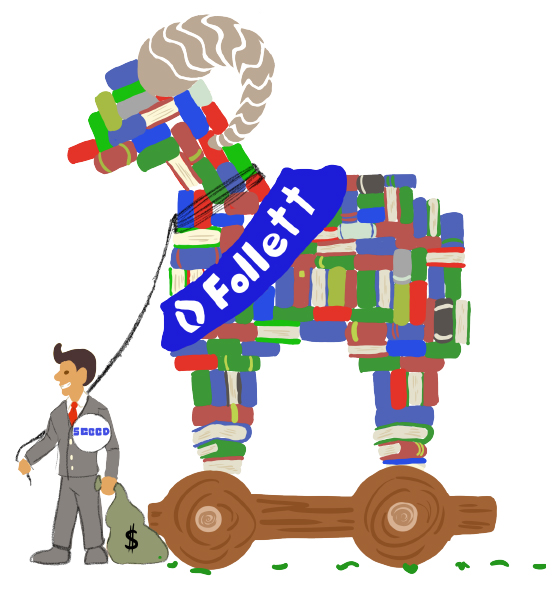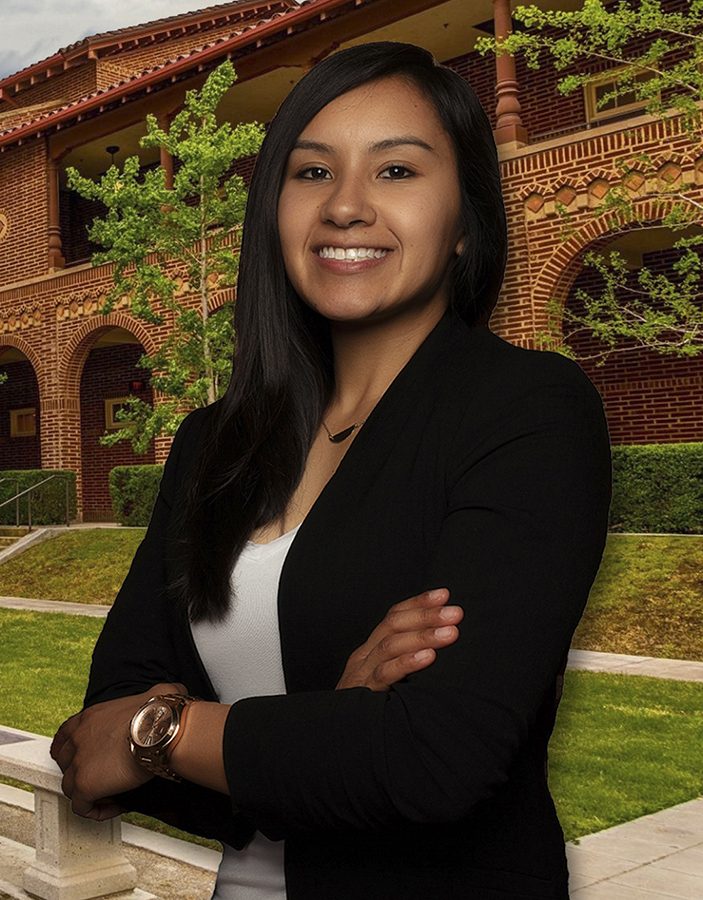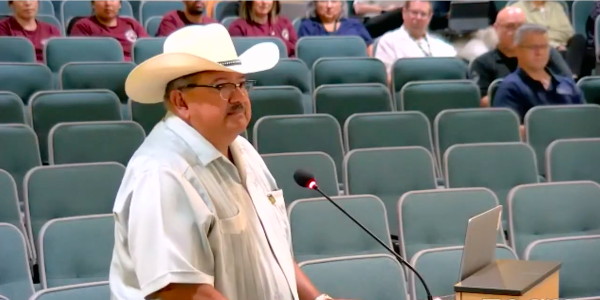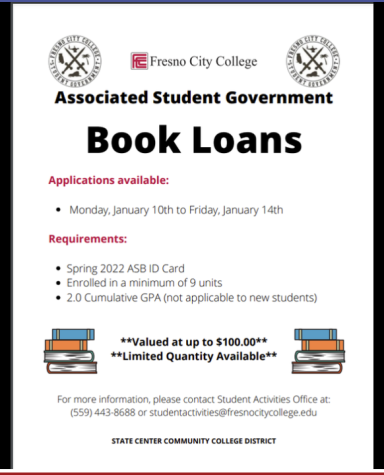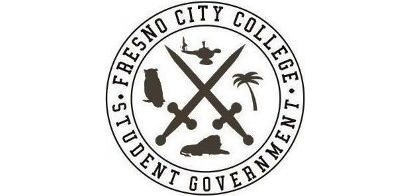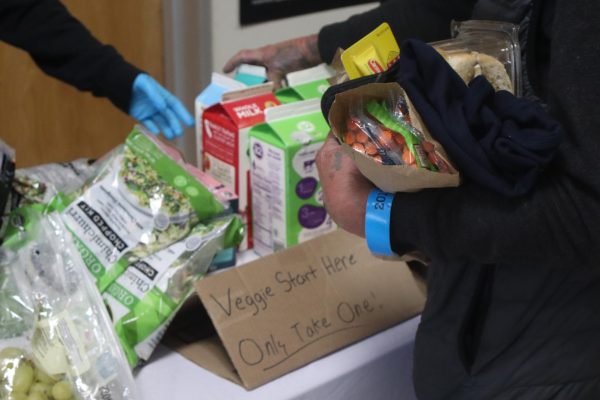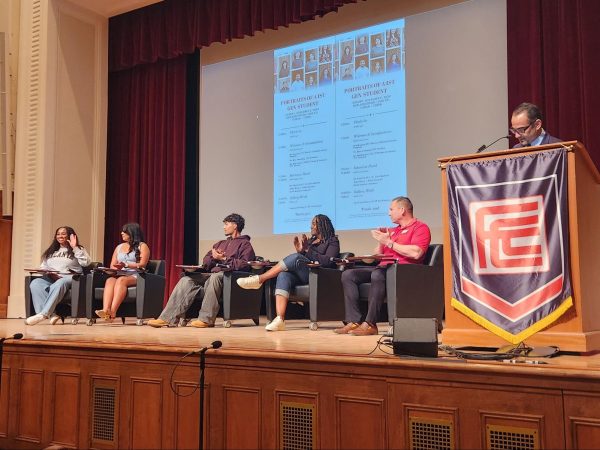‘I Am Done,’ Bookstore Privatization Outrages College Community
“The bookstore failed the students.”
“I am overall VERY displeased with the delays in obtaining books this fall.”
“I am struggling in more than one class because of a lack of textbook/scantron.”
These statements, drawn from anonymous students’ responses to the Fresno City College bookstore survey conducted on Sept. 5, reflect the students’ angst over the recent privatization of the college bookstore.
Instructors had to adapt syllabuses.
Students struggled, making do with no textbooks or access codes to ebooks.
No scantrons meant regularly assigned quizzes were cancelled or postponed.
“It was a mistake,” DeRon Walker, president of the Associated Student Government, said about the decision to privatize.
All State Center Community College District bookstores—including FCC—were privatized in July 2019 after a 5-2 vote by the Board of Trustees in the June 4 meeting.
This transition from self-operation to privatization handed the stewardship of the bookstore to Follett Higher Education, Inc. which has negatively impacted a number of students, according to the results of a survey conducted by Institutional Research office at Fresno City College.
According to the survey results, 60% of the respondents stated they did not have a problem with the bookstore. However, in subsequent comments, the same respondents acknowledged that they faced challenges.
“I waited two weeks for a damn book,” one anonymous student commented.
“Scantrons are pieces of paper that shouldn’t be costing students almost $3 to purchase,” another responder stated, adding that students struggle every year, often grappling with high prices, in order to purchase materials from the bookstore.
Forty percent of respondents marked that they had an issue with the bookstore and of those students, 70% said their textbook was out of stock.
The survey received a high response rate of 1,412 students within the first 24 hours, and 2,592 responses in total.
Lola Gayles was an A and B student at FCC before the 2019 summer semester. She didn’t receive her textbooks until after the end of the summer classes she took.
Gayles did poorly in both courses.
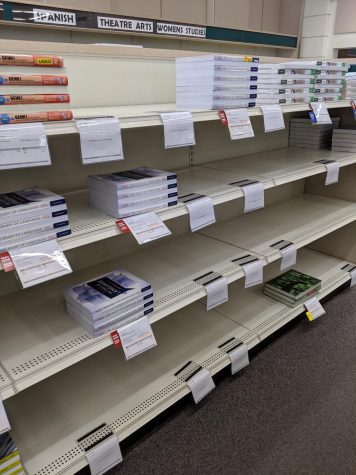
Students dealt with empty shelves well into the semester, Sept. 24, 2019.
Empty Shelves
From 2015 to 2016, $42 million in financial aid and scholarships were awarded to FCC students, according to the Admissions and Aid page on the FCC website.
For FCC students, each semester is either paid out of pocket or expected to be completed in the designated time allowed by financial aid. Financial aid is affected by a student’s success in the classroom—success that requires classroom materials. They have no room for error.
The Extended Opportunity Programs and Services (EOPS) and CalWORKs vouchers can only be redeemed at the college bookstore, and the assistance is time-sensitive.
EOPS provides funding for students who are either first generation college students, English language learners, disadvantaged foster youth, or those who are facing other present educational challenges.
During the bookstore transition period, a malfunction meant that the bookstore couldn’t process EOPS and CalWORKs vouchers.
“I am surprised because this was a company that works with other institutions and large institutions, and yet for some reason, it appears they don’t know how to work with an educational institution,” said Thom Gaxiola-Rowles, director of EOPS.
Often, the books just weren’t there. The bookstore’s empty shelves were a problem for students like Jayleen Gonzales, a radiology major who couldn’t get any of her required materials.
“I was getting my money from EOPS, so I had a limited amount of time to get my books,” she said.
Gonzales said the bookstore will not have her textbook until the end of the semester, far beyond the EOPS deadline. Gonzales scrambled for the money to turn to Amazon for her books.
“Personally, it affected me in a really bad way,” Venesha Davis, a student, said. She couldn’t get any of her books with her CalWORKs voucher.
CalWORKs provides educational funding and cash assistance to families, often single parents, who have children in the home.
“It kind of makes me feel like I’m separated from everyone else in the school,” Davis said. “I feel like when people are in those extra programs, they don’t have any supplies for us. We all go to the same school, why can’t we have the same supplies as everybody else?”
“That was a real issue for our students because they should not be treated differently than any other student just because they have a voucher,” said Gaxiola-Rowles.
Shannon Simpson wasn’t able to get his geography textbooks from the bookstore. He went online instead. “If I hadn’t gotten the book online, it probably would’ve affected my grades,” he said. “I wouldn’t have been able to read from anything.”
Student Adriana Saiz said she liked getting her books from the on-campus bookstore until recently. “I just walked into the bookstore, and it was like chaos. I feel like no one really knows what’s going on,” she said.
Without the materials she needs to succeed, Saiz relies on collaborating with other classmates to stay on track with the class. She’s become annoyed with having to depend on classmates to bring her copies of papers or send her photos of the assigned reading.
“I have to rely on the person I sit next to and sometimes they’re not there. I have to go out of my way to hunt down pages for my homework,” she said.
Gonzales and Saiz are fortunate to have cooperative teachers who do whatever they can to help their students succeed.
Gonzales said more than one instructor has gone out of their way to find downloadable PDFs of the course material and share it with their students. Her other professors have even shared pictures of textbooks purchased by the more fortunate students.
“I don’t think it’s just students. I think it’s affecting teachers as well. It’s harder for the class to continue to flow because half of the students are behind,” Saiz said. “Teachers want students to have their books. That’s what they want more than anything.”
English professor Lee Herrick has tried to be mindful of students’ unique situations and make adjustments. “It’s not good for anybody involved,” he said.
“I think it’s terrible on many different levels,” said Academic Senate Member and FCC philosophy professor Max Parish.
“For one, it’s bad enough if you can’t get the supplies that you need to take a class you paid for,” he said. “Doubling that, if you have already paid for supplies that you’re not getting or aren’t getting refunded, I think it’s terrible.”
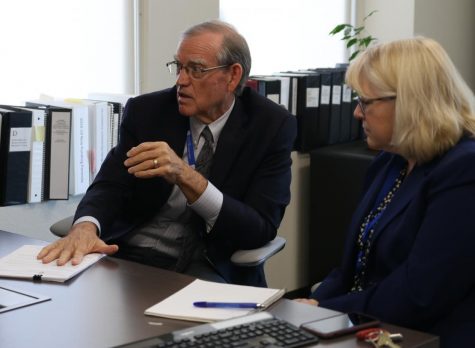
SCCCD District Chancellor Paul Parnell, left, and Vice Chancellor of Finance and Administration Cheryl Sullivan, right, sit down with Rampage reporters to discuss the status of the Fresno City College community after the privatization of the bookstore on Sept. 20, 2019.
How We Got Here
The FCC bookstore has been a self-operated successful resource for its students since it opened in 1940, according to the Office of Public Information at FCC.
The road to privatization was contentious but only became public during the May 7 Board of Trustees meeting at the Oakhurst Community College Center. A discussion of the privatization of the bookstore was Item 10.03 on the agenda.
During the public comments, Christopher Cupp, a former bookstore sales associate, and Carmen Alessandro, California School Employees Association (CSEA) officer, argued against privatization, citing the bookstore’s solvency, and the 13 employees that would lose their jobs.
The board postponed the privatization decision until its negotiation with the CSEA union was completed.
According to the Board of Trustee meeting minutes on June 4, many concerned individuals, including Cupp; Suzie Chambers, a CSEA labor relations representative; Barbara Mendoza, a textbook purchasing specialist; Jewell Riversmith, first vice president of CSEA chapter 379; and Kathleen Swan, a bookstore sales associate, said the district was “being blindly led down the path of outsourcing,” and implored the board to reject the proposal to privatize the bookstore.
They cited concerns about employees losing their livelihoods, the quality of the bookstore employees’ service to the district as well as the potential loss of the bookstores’ funding of co-curricular activities.
Additionally, those opposing the potential privatization presented a research they had conducted showing that if the district must privatize, it should go with Barnes & Noble rather than Follett.
They expressed other concerns about SCCCD’s process in pursuing the privatization—the lack of transparency with the CSEA organization, making unilateral decisions, and the perceived lack of concern for the employee.
Shane Dishman, vice president of CSEA for the state of California, said privatizing the bookstore undermines the mission and vision of the college district. He warned that a yes vote by the board would galvanize opponents into political action and lead to defeat in future elections.
Speaking in support of privatization, Tom Byrne of Campus Bookstore Consulting urged the board to follow the national trend of privatizing college bookstores. He cited competition from Amazon as well as the challenges of maintaining a positive profit margin.
Byrne, who was not affiliated with Follett, added that only through privatization that the district meet the requirements of its Request for Proposal—improved affordability for students; cutting-edge retail innovation and improved customer satisfaction; increased market share; state-of-the-art destination/retail facilities, and increased financial contributions to the district.
The Deal
The Board of Trustees voted 5-2 to authorize the chancellor or vice chancellor of finance and administration to enter into an agreement with Follett Higher Education Group, Inc. on behalf of the district for a six-year period.
The group would operate retail bookstores and online bookstores across all district locations. Trustees Magdalena Gomez and Annalisa Perea voted against the contract.
According to the terms of the deal, Follett would guarantee a payment of $900,000 to the district in the first year of the contract, as well as ongoing payments in the following years. Follett will invest $470,000 in facility and technology and contribute $100,000 annually to student success scholarships.
Follett will “price match any brick and mortar stores” and implement online ordering, and they will be able to interface with the current Canvas software.
The trustees remain divided on the decision.
“We’re committed as a district to do right by the students and the faculty,” said Deborah Ikeda, president of the Board of Trustees.
“I wasn’t convinced that this was the best path forward for our students and faculty,” Trustee Annalissa Perea said. “This issue has been a direct threat to the success of our students and the ability of our faculty to teach accurately.”
Trustee Eric Payne defended his vote for the contract, saying, “We were placed with some really tough decisions as it relates to, ‘Do we take from students success programs? Do we cut faculty? Where do we identify cutbacks?’”
“Our greatest investment is in our students,” he said.
SCCCD Chancellor Paul Parnell initially made excuses for the rush to privatize and the speedy transition. “Our goal is to serve our students,” he said.
“The credibility of that statement is questionable,” Sean Henderson, dean of students, said.
Parnell explained that the consideration for privatization of the district’s bookstores has been in the works for 20 or 30 years.
“I’ve seen a deposition to buy a stapler take longer,” Henderson said.
No Fixes
The array of problems present during the transition has raised questions about the credibility of Follett Higher Education, Inc., the textbook distribution company.
In 2017, EdSurge news published an article discussing a lawsuit filed by three major publication companies against Follett.
“As part of the agreement to adopt the principals, the publishers dismissed their case against Follett, which claimed the company was purchasing illegal copies of textbooks and selling them at its college stores and through other distribution channels,” read the article.
“Sometimes in 1,200 stores, there will be specific instances where something happens,” Sarah Foisy, Follet District Manager, said in response to a question about Follett’s reputation. “So the one thing we try to do is that when a challenge comes up, we want to make sure that we are addressing those challenges and preventing that from happening again.”
SCCCD Chancellor Paul Parnell was discouraged by the transition to privatization.
“There were significant negative things that happened in the transition period,” he admitted.
Chancellor Parnell and Vice Chancellor Cheryl Sullivan insist they stand behind their choice to privatize the bookstore and the contract with Follett Higher Education, Inc.
Sullivan said that she consulted with Follett about time management and the transition, given the brief window of time between the award of the contract and the beginning of the semester.
“They [Follett] felt that this has been done many times before,” Sullivan said. “We took their advice. It did not go as well as anticipated.”
She said technological issues plagued the transition as well.
Sarah Foisy, Central California regional manager for Follett, blamed “the short runway,” for the problems with the transition which disillusioned hundreds of students, per the survey.
“We [Follett] came in one month before classes started,” she said.
Foisy said that Follett Higher Education primarily goes through AT&T for its technological services, and that AT&T works at its own pace and that has become something they expect when setting up at a new campus.
Parnell said that AT&T has done more than provide Follett with technological services. They went a step further and granted SCCCD with $40,000 “that will all go to students in the district for their books.”
A major complaint against Follett management is their inability to process vouchers or work with EOPS and CalWORKs students.
“We do honor EOPS and CalWORKs,” FCC bookstore manager Paul Klays said. “It was a matter of us being unable to accept them [vouchers] at that particular time.”
Seven weeks into the semester, books are still missing from the shelves.
“At this point, they [Follet] haven’t proven themselves to be reliable,“ said Thom Gaxiola-Rowles.
However, Sullivan said the problems will be resolved and that books will be stocked to 120%. “That’s their normal—actually stocking to a higher degree.”
Disregarding these first few weeks due to the rough transition, Sullivan said, “We are trying to focus really strongly on the second nine weeks.”
The district wants the bookstore to compete favorably with mega online retailers such as Amazon so to get the district bookstores to a competitive standard, privatization seemed like the clear pathway.
The pathway, however, has shown to be a long and tiring journey.
Promises of price matching at student leisure is one of the glimpses of hope.
General education required course textbooks such as Geology 1 are listed as a connect access code and paperback new for $101.50 and paperback used as $76.25.
If said promises are kept, this Geology 1 textbook will be expected to be price matched at a lower rate from either “a) a brick and mortar bookstore within fifteen (15) miles of any of the DISTRICT’s campuses, or (b) an online retailer, with the exception of online
marketplaces including ‘other sellers’ on Amazon and peer-to-peer markets,” according to “Exhibit C: Course Materials Requirement” of the contract.
Additionally, CSEA operatives opposed privatization in part because of potential layoffs.
“We had 13 full time staff that we had to negotiate with,” Parnell said. “Our commitment was to find a
ll of those previously working in the bookstore positions in the district.” There were no layoffs.
Previous district bookstore employees were provided the opportunity to either reapply for their positions in the bookstore or transition into district positions, with a guaranteed six month transition.
When the previous bookstore employees transitioned out, Follett employees replaced them.
Paul Klays, the new FCC bookstore manager, is one of several district bookstore managers. The district went from having one bookstore manager, Miles Abrahamson—who supervised all district bookstores—to having one manager at every campus.
Abrahamson, one of the bookstore employees to stay with Follett, declined to comment on the privatization of the bookstore and the impact that it has had on students and faculty. Follett has promoted him to a new role.
The Future of the Bookstore
The privatization of the district bookstores happened at every SCCCD campus, but FCC seemed to take the hardest hit.
“Our programs for CalWORKs and EOPS, all those impoverished students programs are much more, in greater numbers,” Walker said, “And they’re the ones being impacted.”
Everyone is impacted, but students who are recipients of some government funded programs suffered most because they were denied supplies they needed for their classes.
Technology failed, and everything that could go wrong did.
Is Follett the district’s Trojan horse?
Regardless, this process has left a sour taste in the mouth of the campus community.
“Their [students] frustration, we are the ones hearing that,” said Academic Senate President, Karla Kirk in a Sept. 12 interview with ABC30. “We are getting the stories, their tears, their anxiety and their fear that they’re going to fail this semester of college.”
Are future FCC students doomed to the same reality?
“The results will speak for themselves,” said bookstore manager Klays.
Jayleen Gonzales said, “I’m not going to buy from there again.”
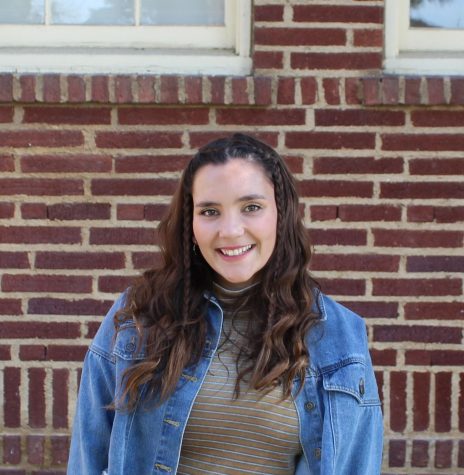
Hannah Lanier is the 20 year old New Editor and reporter for the Rampage at Fresno City College. Born and raised in Fresno, California, Lanier is the youngest...

Patrick Henslee is in his third semester at the Rampage, and steps into the role of Managing Editor for the Spring 2020 semester. The 20-year-old is an...

Avery Johnston, 26, is a third year college student at Fresno City College. She is graduating this semester from FCC as a journalism major. Avery will...

Kris with a K like Kool-aid is a reporter for the Rampage. Kris is a 21-year-old government journalism major who drives a Prius named Cherryl that he parks...

Ben Hensley is a fifth semester journalism student at Fresno City College. Having been with the Rampage for all five semesters, Hensley has progressed...

